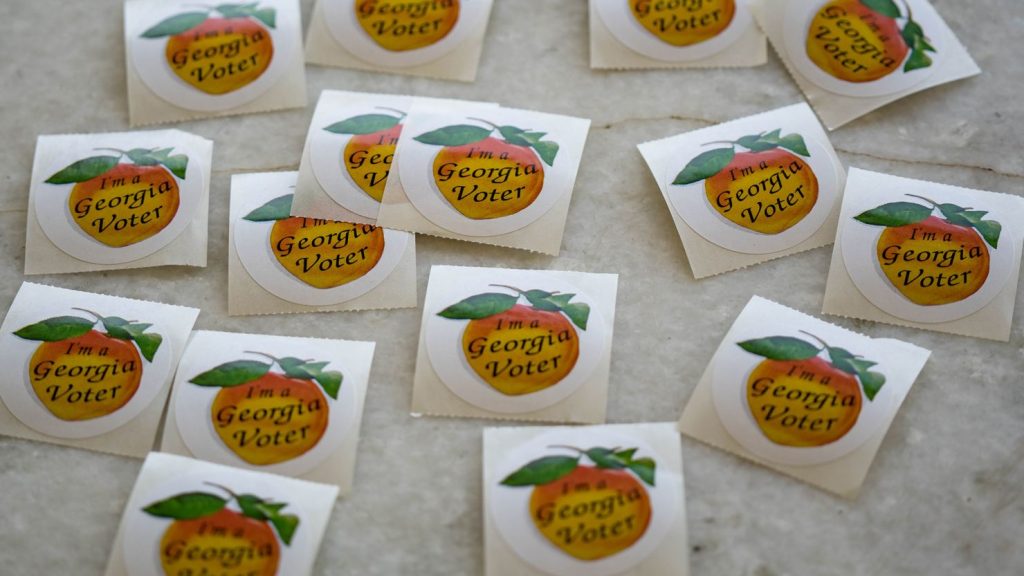Federal Judges Deny Requests to Extend Voter Registration Deadlines in Georgia and Florida Amid Hurricane Disruptions
3 min read
A pile of stickers for voters at Park Tavern on November 3, 2020 in Atlanta, Georgia. Megan Varner/Getty Images

A pile of stickers for voters at Park Tavern on November 3, 2020 in Atlanta, Georgia. Megan Varner/Getty Images
In a significant decision, two federal judges have declined to extend the voter registration deadlines in Georgia and Florida, despite the ongoing challenges posed by recent hurricanes in the Southeast. The rulings come as both states grapple with the aftermath of Hurricane Helene and prepare for the impact of Hurricane Milton, which made landfall on Florida’s western coast late Wednesday.
Voting and civil rights organizations have been advocating for extended voter registration periods, arguing that the devastation caused by these storms has made it difficult for many residents to register in time for the upcoming November election. US District Judge Eleanor Ross, presiding in Atlanta, rejected a request from groups including the NAACP, the Georgia Coalition for the People’s Agenda, and the New Georgia Project to extend the registration deadline by one week. She stated that the arguments presented “lacked clarity and detail” regarding how individuals were specifically harmed by the current deadline.
Attorneys for Georgia’s Republican Governor Brian Kemp and Secretary of State Brad Raffensperger contended that extending the voter registration deadline would impose a significant “administrative burden” on state election offices. In her ruling, Ross concurred, emphasizing that “the harms to the state’s interest outweigh the interest of the plaintiffs.” She noted that the plaintiffs failed to identify any specific statute or authority that would necessitate an extension, saying, “We did not hear from anyone specifically who could not register to vote.”
In Florida, a similar scenario unfolded when US District Judge Robert Hinkle turned down a request from civil rights groups seeking to reopen the state’s voter registration window. The deadline had closed on Monday, coinciding with the ongoing recovery from Hurricane Helene and the impending threat of Hurricane Milton. Hinkle, appointed by former President Bill Clinton, dismissed the request a day after it was filed by the League of Women Voters of Florida and the Florida NAACP.
The groups argued that the October 7 registration deadline was unreasonably timed, “sandwiched between two life-threatening obstacles” that forced some residents to choose between their safety and registering to vote. Without an extension, their legal representatives contended that many potential voters would be deprived of their fundamental right to vote due to the devastation caused by the hurricanes and the resulting shutdown of various voter registration methods, including government offices, roads, the Internet, and postal services.
As Florida braced for Hurricane Milton on Monday, Governor Ron DeSantis addressed concerns regarding voter registration during a press conference. He stated, “People can register today, and then that’s that. There’s nothing inhibiting your registering today. The storm has not hit yet.” DeSantis expressed confidence that the existing registration deadline would not change, noting, “Now, after the storm, we will see what damage is there. And if I have to do a similar executive order that I did in Hurricane Ian and then for Helene, we’re happy to do it. But we’re not going to change any registration deadline.”
These judicial decisions have ignited debates about voting rights and accessibility in the wake of natural disasters. Many civil rights advocates argue that in times of crisis, it is imperative to ensure that the electoral process remains inclusive and that all citizens have a fair opportunity to participate in elections. The hurricanes have already disrupted communities, and the refusal to extend voter registration deadlines raises concerns about disenfranchisement.
As the November election approaches, the implications of these rulings could significantly affect voter turnout in both Georgia and Florida. With millions of residents potentially impacted by the storms, the call for flexible registration options remains a critical issue. Advocates continue to push for reforms that would ensure that no eligible voter is turned away due to circumstances beyond their control, particularly in the wake of disasters like hurricanes.
The situation remains fluid, with both states still assessing the damage from the hurricanes and the impact on their communities. As citizens navigate the complexities of recovery, the commitment to ensuring access to the ballot box will be closely watched in the coming weeks. The intersection of natural disasters and electoral rights presents ongoing challenges that demand attention from lawmakers, election officials, and the judiciary alike.